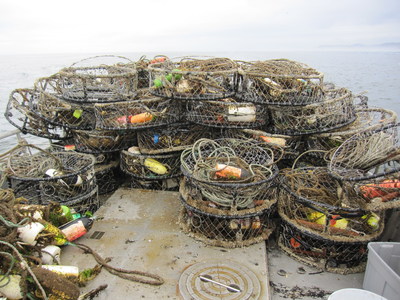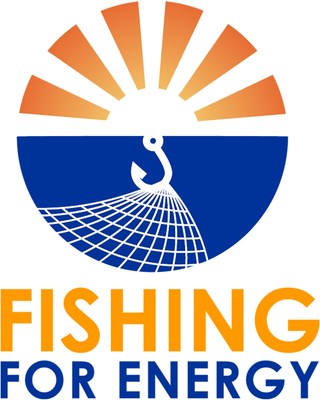Fishing for Energy Adds New Port in Washington to Support Marine Debris Efforts
Published on by Kim van Arkel, Scientific Advisor
Collection bin to provide free recycling and disposal for derelict fishing gear and marine debris removed from local waters
WESTPORT, Wash., Oct. 14, 2016 /PRNewswire/ -- The Fishing for Energy partnership, an innovative public-private effort that protects marine wildlife from becoming trapped in lost, abandoned or discarded fishing gear, today announced that it is partnering with the Port of Grays Harbor's Westport Marina to recycle an estimated 1,050 crab pots and other marine debris.
Efforts to collect the unwanted gear have already begun as part of a project managed by The Nature Conservancy and the Quinault Indian Nation. A new Fishing for Energy collection bin has been placed at the Westport Marina in Westport, Washington.
"Fishermen in Westport will now have a convenient place to get rid of their old gear so it doesn't end up in our waters," said Congressman Derek Kilmer, 6th District, Washington. "In the process, they are helping generate power for the Pacific Northwest. This partnership shows that our region is leading the way in showing we can protect our coasts while creating new energy opportunities."
Fishing for Energy is a nationwide partnership between the National Fish and Wildlife Foundation (NFWF); the National Oceanic and Atmospheric Administration (NOAA) Marine Debris Program; Covanta, a world-leading sustainable waste and energy solutions company; and Schnitzer Steel Industries, one of the largest metal recycling companies in the United States. The partnership offers conveniently located collection bins for disposal of old fishing gear, making it easy for fishing communities to deal with the issue of derelict gear. As a result, the partnership reduces the amount of gear that ends up in U.S. coastal waters, recycles gear made of metal and processes the remaining gear and debris to generate renewable energy at Covanta's Energy-from-Waste facilities.
The three-year marine debris removal project being led by The Nature Conservancy in Washington is supported by the NOAA Marine Debris Program. This work builds on existing marine debris programs conducted on Washington State's outer coast to remove derelict fishing gear and improve waterways.
"The proper disposal of fishing gear can help minimize impacts that lost or abandoned nets, lines, and traps can have on our natural resources and our economy," said Nancy Wallace, Director of the NOAA Marine Debris Program. "We are excited about this first bin located in Washington state which will not only collect gear from local port users, but also derelict crab pots collected by The Nature Conservancy and its partners - the Quinault Indian Nation and the Quileute Indian Tribe - as part of a NOAA Marine Debris Program Community-based Removal Grant."
TNC is partnering with the Quinault Indian Nation to develop a tribal fisheries program focused on community-based derelict pot reporting. The project includes outreach and education efforts to help Quinault fishermen reduce accumulation of derelict crab pots and report pots for recovery.
"The derelict gear removal project, as well as the efforts of the Fishing for Energy program, are both excellent examples of innovative solutions to address longstanding threats to the health of our communities and the ocean habitat, while at the same time bringing economic benefits to the coastal communities," said Kara Cardinal, Marine Projects Manager at TNC.
The Fishing for Energy partnership provided a partial match to this project to fund the transportation of the unusable gear to Schnitzer Steel's metal processing facility in Tacoma, Washington. After shredding, any metal will be recycled and the remainder of the marine debris will be transported to Covanta's facility in Marion County, Oregon to generate electricity for area homes and businesses.
Since launching in 2008, Fishing for Energy has processed more than 3 million pounds of old fishing gear, a portion of which has been retrieved directly from the ocean by fishermen. Fishing for Energy is a recipient of the prestigious Coastal America Partnership Award, which is presented to groups that restore and protect coastal ecosystems through collaborative action and partnership. The partnership has expanded to include a grant program that directly supports efforts to remove derelict fishing gear from U.S. coastal waters and will continue to partner with new ports to promote retired or derelict fishing gear collection through community education and outreach.
For more information on the partnership visit: www.nfwf.org/fishingforenergy.
Project Partners
National Fish and Wildlife Foundation
The National Fish and Wildlife Foundation (NFWF) protects and restores our nation's wildlife and habitats. Chartered by Congress in 1984, NFWF directs public conservation dollars to the most pressing environmental needs and matches those investments with private contributions. NFWF works with government, nonprofit and corporate partners to find solutions for the most intractable conservation challenges. Over the last three decades, NFWF has funded more than 4,500 organizations and committed more than $3.5 billion to conservation projects. Learn more at www.nfwf.org.
National Oceanic and Atmospheric Administration (NOAA)
NOAA's mission is to understand and predict changes in the Earth's environment, from the depths of the ocean to the surface of the sun, and to conserve and manage our coastal and marine resources. The NOAA Marine Debris Program supports community-based removal projects across the country to help benefit coastal habitat, waterways and wildlife including migratory fish. To learn more about current and past projects visit the program's Marine Debris Clearinghouse. For more information visit: www.marinedebris.noaa.gov.
The Nature Conservancy
The Nature Conservancy's mission is to conserve the lands and waters on which all life depends. In Washington, our goal is to spark a revolution in ocean protection that sustains diverse marine habitats, abundant fisheries, and coastal economies and cultures. Our Washington Coast derelict gear removal project builds on existing marine debris programs on Washington State's outer coast to remove derelict fishing gear and other marine debris from coastal waters to restore habitats and improve waterways. This community-based project is a partnership between the Conservancy and the Quinault Indian Nation, with support from the NOAA Restoration Center and Marine Debris program. It will result in diminished threats to marine mammals and fish while improving their habitats.
Covanta
Covanta is a world leader in providing sustainable waste and energy solutions. Annually, Covanta's modern Energy-from-Waste facilities safely convert approximately 20 million tons of waste from municipalities and businesses into clean, renewable electricity to power one million homes and recycle approximately 500,000 tons of metal. Through a vast network of treatment and recycling facilities, Covanta also provides comprehensive industrial material management services to companies seeking solutions to some of today's most complex environmental challenges. For more information, visit covanta.com.
Schnitzer Steel Industries, Inc.
Schnitzer Steel Industries, Inc. is one of the largest manufacturers and exporters of recycled metal products in the United States with operating facilities located in 24 states, Puerto Rico and Western Canada. Schnitzer has seven deep-water export facilities located on both the East and West Coasts and in Hawaii and Puerto Rico. The Company's integrated operating platform also includes auto parts stores and steel manufacturing. With an effective annual production capacity of approximately 800,000 tons, the Company's steel manufacturing business produces finished steel products, including rebar, wire rod and other specialty products. The Company began operations in 1906 in Portland, Oregon.
The Westport Marina
The Westport Marina, a facility of the Port of Grays Harbor, is the hub of commercial and recreational fishing on Washington's Coast. As Washington State's largest commercial fish landing port, the Marina's activities support more than 2,300 jobs in southwest Washington. For more information about the Westport Marina and Port of Grays Harbor visit portofgraysharbor.com.
Attached link
http://www.oilandgas360.com/fishing-for-energy-adds-new-port-in-washington-to-support-marine-debris-collection-efforts/Taxonomy
- Water & Energy Conservation

